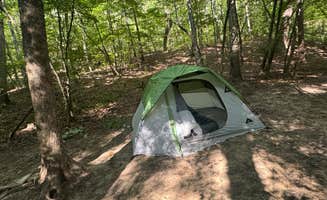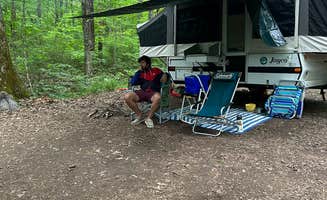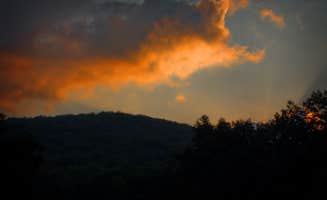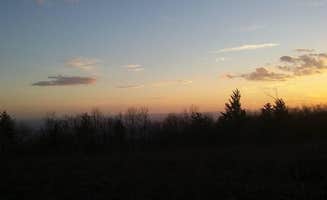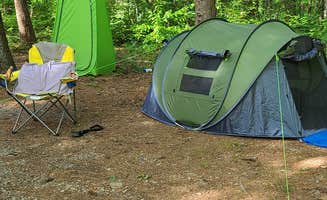Dispersed camping near Armuchee, Georgia offers primitive sites across the Chattahoochee National Forest and nearby Wildlife Management Areas. The area sits at the southern edge of the Appalachians with elevations ranging from 700-1,200 feet. Summer temperatures typically reach 85-90°F with high humidity, while winter nights often drop below freezing, impacting water availability and road conditions.
What to do
Hiking accessible trails: Songbird Trail in Cohutta Wildlife Management Area provides relatively easy access to nature walks. "This area will speak for itself once you arrive. It's very peaceful and calming, beautiful hikes, pretty nature, and great memories! I've been here every year since I was 16 and I will continue to return!" notes a regular visitor to SongBird Trail Camp.
Stargazing opportunities: The remote locations offer minimal light pollution for astronomy enthusiasts. A camper at Ball Field Dispersed Camping Area recommends: "Go here on a new moon night in the summer and you're sure to have a great night of uninterrupted beauty!" The south-facing view from this location makes it particularly suitable for viewing the Milky Way.
Swimming in natural areas: Blue Hole at Crockford-Pigeon Mountain offers a natural swimming destination during warmer months. One camper reports, "It has a blue hole an caves no electricity or running water but the camp sites are pretty good. An the do have a handicap access area for rvs to do disperse camping also an parking for the bluehole."
What campers like
Solitude and privacy: Many dispersed sites provide isolation not commonly found in developed campgrounds. At Hidden Creek Campground, campers appreciate the seclusion: "We went out and found this place and setup our campsite very nice secluded and away from people very few people out here."
No-cost camping options: All dispersed sites in the area are free, though some require permits. One camper at Blue Hole Dispersed mentions: "Land pass required. No alcohol is permitted. This is a wildlife management area. The camp sites are first come, first serve. They are free. Only 2 sites with tables."
Seasonal wildlife viewing: Spring and fall provide opportunities for bird watching and observing native plants. A frequent visitor to Ball Field notes the surrounding ecosystem: "One can hike up to the top of nearby Bald Mountain and then hike down to the Conasauga River. One can look for butterflies, other insects, birds, flowers, etc."
What you should know
Road condition challenges: Most sites require navigating unmaintained forest roads. A Hidden Creek camper warns: "There are a few substantial pot holes, so wouldn't recommend for someone driving a super low vehicle. Also GPS isn't perfect. It will take u to someone's private property next door."
Bear safety precautions: Food storage and proper waste disposal are critical in these areas. A regular at Ball Field advises: "There are bears in the area and they love food. A fed bear is a dead bear-please don't leave any food out and scare them away if they come around."
Seasonal overcrowding: Popular sites fill quickly on weekends and during peak seasons. "First location was Hickey Gap, we got there around 1 on a Friday and it was full so we headed to the primitive group camping site," reports one visitor about finding alternative camping at Ball Field.
Limited facilities at Murray's Lake: The primitive nature extends to all amenities. A camper describes Murrays Lake Primitive: "There is a lake, but it's not all that pretty. There's a boat ramp, but the lake is small and I doubt it's worth the trouble. There are 2 drive in tent spots, with 2 more at the end of a trail."
Tips for camping with families
Site selection timing: Arrive early on weekdays when possible to secure the best spots. One camper at Tennessee Wall Camp advises: "We really enjoyed our night tent camping here. There is a parking lot right off the road after a fun ~30 minute drive through residential roads right on the water, then sites with fire pits are scattered throughout a small clearing."
Pack extra water: No reliable water sources exist at most sites, requiring families to bring all drinking water. A Blue Hole visitor notes: "If you like dispersed camping you'll probably enjoy it. If you prefer a campground, this is not for you."
Prepare for insect encounters: Ticks and mosquitoes are common from April through October. One camper at Blue Hole reported: "Stepped out just to see the clearance on a turn and got in with 4 ticks on me."
Tips from RVers
Smaller rigs only: Most dispersed sites can accommodate small trailers and campervans but not large RVs. A camper at Blue Hole Dispersed mentions: "We stayed 3 days 2 nights here in our 21' pop up camper with our generator. Road is pretty well maintained, spots are good size, some only large enough for tent/car camping."
Site leveling challenges: Uneven terrain requires leveling equipment for comfortable stays. A visitor to Ball Field notes: "The field is fairly sloped, so you want to have some shoring if you are in a trailer, roof top tent, or van."
Generator considerations: Some areas have noise restrictions or complete generator prohibitions. Check regulations before arrival and respect quiet hours for fellow campers.


